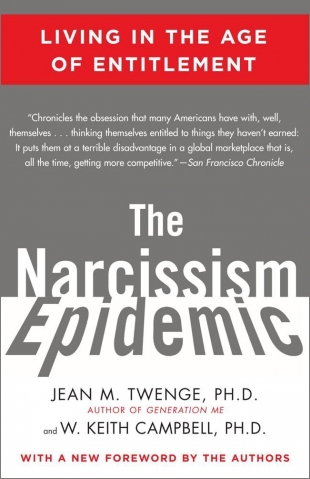In the 1970s, Tom Wolfe charted the growth of "The Me Decade" and in 1979 Christopher Lasch came out with The Culture of Narcissism. This phenomenon has not faded but grown. Jean M. Twenge and W. Keith Campbell draw on extensive research findings that reveal that one in ten Americans in their 20s suffers from narcissistic personality disorder. The authors believe that the country has overdosed on self-esteem and self-admiration. Some of the signs of narcissism are assertiveness, extraversion, dominance, and individualistic focus. Twenge and Campbell provide an in-depth analysis of how this epidemic has become so widespread.
One of the chief causes is parents who have gone overboard in spoiling their children, making them feel "special" by overpraising them, and turning them into competitive zombies from pre-school days through high school. Celebrities have played an important role in the spread of narcissism. They have tutored children in an addiction to consumerism and "the latest thing," the necessity for Botox, plastic surgery, and even white teeth. Television has pushed the importance of physical appearance to the hilt so that "looking hot" has become a major goal of even young girls and boys.
Social networks also have the effect of increasing narcissism. They provide youth with an obvious avenue for fame, attention, and self-promotion. Blogs enable them to express themselves freely and to trash other people's ideas and writings using vile language and personal attacks in their slams. This is only one example of the rise of incivility in America where narcissism leads to aggressive and even violent behavior. Seventy percent of Americans say that people are ruder now than they were 20 years ago.
Narcissism is not only a youth problem. Twenge and Campbell point to the cascading consequences of over-spending by adults which has resulted in the recent financial and mortgage crisis. They discuss the impact of narcissism on relationships, in colleges, at work, on the environment, and in religion. They conclude that "narcissism is the fast food of the soul. It tastes great in the short term, has negative, even dire consequences in the long run, and yet continues to have widespread appeal."
In the last chapter, the authors share some ideas on treating the epidemic of narcissism: character education in schools, quieting the noisy ego through meditation, paying attention to the wider social connections of the world, serving your community, challenging America's core values of unbridled individualism and competition, and many more. This is an important and incisive book of feisty cultural criticism.
